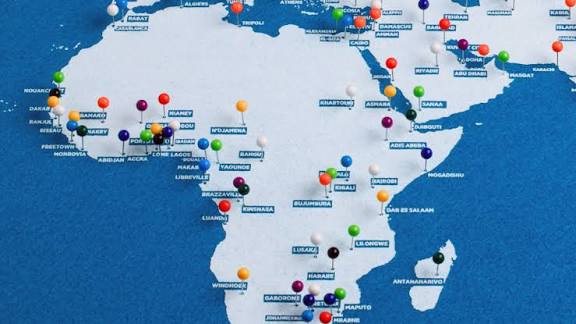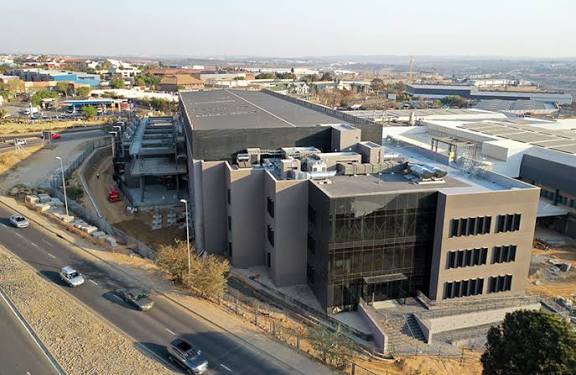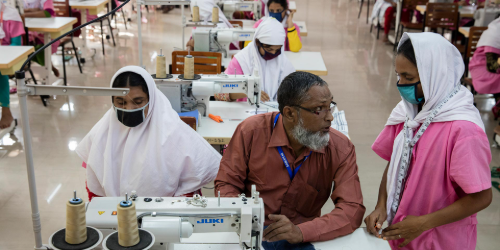A Wired Decade: Africa Rebuilt Itself Through Technology 2015–2025

Twenty years ago, a SIM card was almost a luxury in Nairobi: hawkers filled the streets, and mobile money was another rumor on the airwaves.
Now, Safaricom's Shangwe 25 years campaign lights up the city in celebrations, gadgets, and data bundles, a reminder that Kenya's mobile revolution has become a continental blueprint.
Across Africa nations are connecting, building, coding, flying drones, and designing smart cities that once existed only in imagination.
Over the past decade, Africa subtly assembled one of the most dynamic digital ecosystems in the world, each region carving its own identity, each innovation a beat in the continent's broader pulse.
This story begins with access: early efforts by Africans to expand mobile coverage, push broadband, and digitize public services laid the base for what was to come. Then came mobile money, changing commerce.
Data centres began to rise like sentinels of progress. Governments of the respective countries drafted Startup Acts, digital policies, and cybersecurity frameworks that finally gave shape to youthful ambition. As the decade unfolded, the narrative turned from adoption to creation-from consumption to sovereignty.
East Africa: Catalyst for Access
In East Africa, the tale of innovation has a clear start. Here, they set the blueprint for both inclusion and infrastructure: Kenya remained the trailblazer, with M-PESA redefining access to finance, while Konza Technopolis promised a hub for homegrown innovation with Silicon Valley.
Safaricom's expansion into Ethiopia spread the lessons of regional integration, while gaps once monopolized by the state gradually started to be filled by the private sector.
Rwanda governed through technology, deploying Zipline drones for medical deliveries like deliveryof blood and making digital ID systems to register citizens and smart city initiatives to reimagine national planning.
Tanzania subtly built data centers while expanding digital health and education platforms and Ethiopia opened its telecom sector and nurtured local software startups, proving that policy can be used to catalyze entrepreneurship.

Where else, but here, does the tech scene meet daily life? TikTok challenges are choreographed around mobile money transfers; Nairobi-based content creators collaborate with fintech brands, while local memes on Simu yangu imeisha data capture the humor and frustrations of connectivity. It is East Africa that created Africa's first digital corridor, where infrastructure met imagination and culture blended with tech.
Latest Tech News
Decode Africa's Digital Transformation
From Startups to Fintech Hubs - We Cover It All.
West Africa: The Hustle Engine
West Africa brought scale and entrepreneurship to the fore. Nigeria hustled to become the fintech capital of the continent, with its Flutterwave and Paystack facilitating easier payments for millions of businesses.

Ghana pushed through its Digital Ghana Agenda by rolling out the Ghana Card and installing local assembly for smartphones.
Senegal built the Dakar Technopole and pursued SN2025 for digitization, integrating research, government services, and commercial innovation. Here, innovation started from scale and necessity.
This region pulses with cultural resonance: on Instagram and X, viral Nigerian fintech explainer reels feature comedians like Broda Shaggi or Funnybone breaking down digital payments.
Afrobeats artists drop tracks referencing cashless life, while memes about Ghanaian e-wallet struggles travel like fibre optic lines. Necessity found its opportunity, and with it, an entrepreneurial identity that could thrive locally and globally.
Southern Africa: The Infrastructure Bedrock
Southern Africa anchored the continent in both hardware and infrastructure. South Africa invested in data centres, cybersecurity, and renewable technologies that provided the backbone for regional innovation.

Zambia integrated renewable energy with smart agriculture; working on software outsourcing and startups amidst economic challenges.
In this way, too, culture and tech intertwined. Startup meetups in Johannesburg have been live-streamed on LinkedIn, while content creators across TikTok show solar-powered devices keeping rural communities online.
Local slang, such as "Sharp-sharp" to celebrate the efficiencies of tech, surfaces in campaigns and everyday conversations. The region became a laboratory for tangible capacity, turning ambition into infrastructure able to support digital ecosystems across Africa.
North Africa: The Policy Architects
Latest Tech News
Decode Africa's Digital Transformation
From Startups to Fintech Hubs - We Cover It All.
Most components were strategic and related to policy issues: Egypt pushed semiconductor design, digitization of public services, and space technology in order to achieve industrial capacity in the long term; Morocco developed technological poles based on its automotive and aerospace industries and gave way for 5G.

The case of Tunisia demonstrates how an enabling regulatory environment-for example, the early 2018 Startup Act-and effective public-private partnerships can work.
North African culture pulses along with tech. Cairo-based YouTubers review homegrown gadgets, while Moroccan influencers in tech report from the 5G trials happening in Casablanca. Tech hubs in Tunisia hold hackathons where music playlists by local artists fill the air to bring together work, creativity, and identity.
Central Africa: Laying the Quiet Groundwork
Meanwhile, Central Africa was laying the foundation, quietly but surely. Cameroon, despite policy challenges, fostered local ISPs and online retail sites. The Democratic Republic of Congo invested in fibre extension and satellite projects. The completion of such projects amidst high logistical challenges increased the reach.

Even here, culture intersects. The youth of Kinshasa share tutorials on mobile-first businesses via WhatsApp and Telegram; sometimes, viral TikTok dances reference digital progress. It may be slower in Central Africa, but it is building the infrastructure to support the next wave of inclusion, with everyday culture and technology being fully intertwined.
The Next Frontier:
Looking ahead to 2025, the continent seems to face a pivot: whereas connectivity has spread, the next challenge is about sovereignty. Africa needs to make a shift from being connected to producing the technologies it consumes, owning the infrastructure, the fibre networks, and the hardware.
The last decade has shown that the talent and innovation are there; the next ten years will test if Africa can finally take control of its own digital destiny. From the humming streets of Nairobi to the fibre lines in Kinshasa, the drones in Kigali, and the labs in Cairo, Africa has rewritten the blueprint.
The decade shows that African innovation is not a series of isolated triumphs but a continent-wide symphony of persistence, policy, and imagination. The continent is no longer a passive recipient; it is a producer of possibility, ready to shape the next ten years of technological transformation.
You may also like...
Bundesliga's New Nigerian Star Shines: Ogundu's Explosive Augsburg Debut!

Nigerian players experienced a weekend of mixed results in the German Bundesliga's 23rd match day. Uchenna Ogundu enjoye...
Capello Unleashes Juventus' Secret Weapon Against Osimhen in UCL Showdown!

Juventus faces an uphill battle against Galatasaray in the UEFA Champions League Round of 16 second leg, needing to over...
Berlinale Shocker: 'Yellow Letters' Takes Golden Bear, 'AnyMart' Director Debuts!

The Berlin Film Festival honored
Shocking Trend: Sudan's 'Lion Cubs' – Child Soldiers Going Viral on TikTok

A joint investigation reveals that child soldiers, dubbed 'lion cubs,' have become viral sensations on TikTok and other ...
Gregory Maqoma's 'Genesis': A Powerful Artistic Call for Healing in South Africa

Gregory Maqoma's new dance-opera, "Genesis: The Beginning and End of Time," has premiered in Cape Town, offering a capti...
Massive Rivian 2026.03 Update Boosts R1 Performance and Utility!

Rivian's latest software update, 2026.03, brings substantial enhancements to its R1S SUV and R1T pickup, broadening perf...
Bitcoin's Dire 29% Drop: VanEck Signals Seller Exhaustion Amid Market Carnage!

Bitcoin has suffered a sharp 29% price drop, but a VanEck report suggests seller exhaustion and a potential market botto...
Crypto Titans Shake-Up: Ripple & Deutsche Bank Partner, XRP Dips, CZ's UAE Bitcoin Mining Role Revealed!

Deutsche Bank is set to adopt Ripple's technology for faster, cheaper cross-border payments, marking a significant insti...






